Fleurs du Mal Magazine


Or see the index
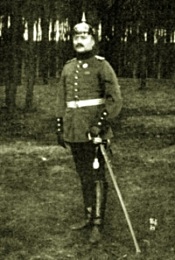
Schön
Wissen Tören
Wahr und Trügen
Mord Gebären
Sterben Sein
Weinen Jubeln
Haß Vergehen
Stark und Schwach
Unmöglich
Kann!
Dein Körper flammt!
Die Welt
Erlischt!
August Stramm
(1874-1915)
Schön, 1914
• fleursdumal.nl magazine
More in: *War Poetry Archive, Archive S-T, Expressionism, Stramm, August
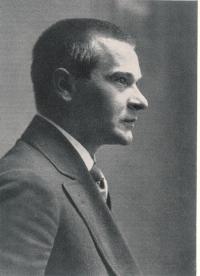
Die junge Magd
1
Oft am Brunnen, wenn es dämmert,
Sieht man sie verzaubert stehen
Wasser schöpfen, wenn es dämmert.
Eimer auf und niedergehen.
In den Buchen Dohlen flattern
Und sie gleichet einem Schatten.
Ihre gelben Haare flattern
Und im Hofe schrein die Ratten.
Und umschmeichelt von Verfalle
Senkt sie die entzundenen Lider.
Dürres Gras neigt im Verfalle
Sich zu ihren Füßen nieder.
2
Stille schafft sie in der Kammer
Und der Hof liegt längst verödet.
Im Hollunder vor der Kammer
Kläglich eine Amsel flötet.
Silbern schaut ihr Bild im Spiegel
Fremd sie an im Zwielichtscheine
Und verdämmert fahl im Spiegel
Und ihr graut vor seiner Reine.
Traumhaft singt ein Knecht im Dunkel
Und sie starrt von Schmerz geschüttelt.
Röte träufelt durch das Dunkel.
Jäh am Tor der Südwind rüttelt.
3
Nächtens übern kahlen Anger
Gaukelt sie in Fieberträumen.
Mürrisch greint der Wind im Anger
Und der Mond lauscht aus den Bäumen.
Balde rings die Sterne bleichen
Und ermattet von Beschwerde
Wächsern ihre Wangen bleichen.
Fäulnis wittert aus der Erde.
Traurig rauscht das Rohr im Tümpel
Und sie friert in sich gekauert.
Fern ein Hahn kräht. Übern Tümpel
Hart und grau der Morgen schauert.
4
In der Schmiede dröhnt der Hammer
Und sie huscht am Tor vorüber.
Glührot schwingt der Knecht den Hammer
Und sie schaut wie tot hinüber.
Wie im Traum trifft sie ein Lachen;
Und sie taumelt in die Schmiede,
Scheu geduckt vor seinem Lachen,
Wie der Hammer hart und rüde.
Hell versprühn im Raum die Funken
Und mit hilfloser Geberde
Hascht sie nach den wilden Funken
Und sie stürzt betäubt zur Erde.
5
Schmächtig hingestreckt im Bette
Wacht sie auf voll süßem Bangen
Und sie sieht ihr schmutzig Bette
Ganz von goldnem Licht verhangen.
Die Reseden dort am Fenster
Und den bläulich hellen Himmel.
Manchmal trägt der Wind ans Fenster
Einer Glocke zag Gebimmel.
Schatten gleiten übers Kissen,
Langsam schlägt die Mittagsstunde
Und sie atmet schwer im Kissen
Und ihr Mund gleicht einer Wunde.
6
Abends schweben blutige Linnen,
Wolken über stummen Wäldern,
Die gehüllt in schwarze Linnen,
Spatzen lärmen auf den Feldern.
Und sie liegt ganz weiß im Dunkel.
Unterm Dach verhaucht ein Girren.
Wie ein Aas in Busch und Dunkel
Fliegen ihren Mund umschwirren.
Traumhaft klingt im braunen Weiler
Nach ein Klang von Tanz und Geigen,
Schwebt ihr Antlitz durch den Weiler,
Weht ihr Haar in kahlen Zweigen.
Georg Trakl
(1887 – 1914)
Die junge Magd, 1913
•fleursdumal.nl magazine
More in: Archive S-T, Trakl, Georg, Trakl, Georg
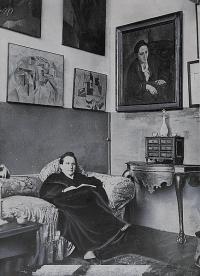 Johnny Grey
Johnny Grey
What did he say. I was disagreeing with him. He said he didn’t have it by his side. He said. Hurry.
Eat it.
I am not going to talk about it. I am not going to talk about it.
Another thing.
This is mentioned. He was silly. He said there would have been many more elevators if it hadn’t been for this war.
He was so thirsty.
They asked him.
Please.
If it weren’t for them there would be wind.
I said there wasn’t.
I said it was balmy.
I said that when I was little I asked for a closet.
This was the way it was written.
I was awed.
It is so injudicious to make plans.
We will not decide about three.
Three is the best way to add.
The bank opens tomorrow.
I was mistaken.
I hope I can continue.
To be a tailor.
The other said nothing.
The other one said he was hindering him and he made that mistake and he would not prepare further.
It is not deceiving.
I can say so gladly.
It’s always better.
It’s wonderful how it always comes out.
Conversational.
Plants were said to bring lining together. This is not deceived. This is not deceived. Plants.
Plants were said to bring meadows springing. Shattering stubbornly in their teeth.
Plants aid sad and not furniture.
This is it.
Plants are riotous.
Not even.
If you give money.
Plants are said to be left out if you give money.
Join or gray.
Points are spoken. This in one. Picturesque. It is just the same.
I cannot freeze.
I understand a picture. It is to have stop it who does. It is to have asked about it the sneezing bell. Bell or better.
A simple extenuation.
I mean to be fine with it.
A picture with all of it bitten by that supper. Call it. I shall please. Nowadays.
I find this a very pleasant pencil. Do I. I find this a very pleasant pencil. Do I find this a pleasant pencil.
How to give soldiers fresh water.
How do you.
You use the echoes.
Dear Jenny.
I am your brother. Nestling.
Nestling noses.
My gay.
Baby.
Little.
Lobster.
Chatter.
Sweet.
Joy.
My.
Baby.
Example.
Be good.
Always.
Six.
Seven.
Eight.
Nine.
All.
The.
Time.
Me.
Extra.
My.
Baby.
Scenes where there is no piece of a let it go.
No I am not pleased with their descriptions.
This is not their year.
Two of them.
Johnny Grey and Eddy.
Why not however.
It was not polite.
A long way.
I understand and I say, I understand him to say that, I see him I say I see him or I say, I say that I understand. What is it. He doesn’t realise. I don’t say that he isn’t there I don’t solidly favor him. I said I was prepared. I was prepared to relieve him. I was prepared to relieve him then or then and I was holding, I was holding anything. I am often for them. They gave it. They were pleased. So pleased and side with it. So pleased and have it. So have it and say it. Say it then. If he was promised, it, he had been left by the belief. He had the action. All old. In it. He was wretched. I do not believe or for it. I do not arouse rubbers. When we went away were we then told to be left with them. Do they or do they do it. Do they believe the truth.
I am beginning. Go on Saturday. I believe for Sunday. We deceived everbody.
I forgot to drink water.
No I haven’t seen it.
He said it.
It’s wonderful.
Target.
They don’t believe it either.
Call it.
That.
Fat.
Cheeks.
By.
That.
Time.
Drenced.
By.
That.
Time.
Obligation.
To sign.
That
Today
When
By
That
Field.
He said he was a Spanish family.
It will make.
A
Terrible
Not terrible.
It will not make that one believe me it is not for my pleasure that I promise it.
No
Neither.
That
Or
Another
Neither
One
Lightly
Widened.
Widened by what.
Not this.
Not left.
Buy
Their
It’s not a country.
I told him so.
I wish to begin.
Lining.
Of that thing.
By that time.
It.
Or.
It.
Was.
How.
We don’t know whom to invite for lunch. You told me you’d tell me. I don’t know.
Either.
I do get wonderful action into them don’t I.
Blame.
Worthy.
Out.
Standing.
Eraser.
That was a seat.
Leave it out.
Seat.
Stretch.
Sober.
Left.
Over.
Curling.
Irresistible.
I come to it at last.
I know what I want.
Call.
Tried.
To be.
Just.
Seated.
Beside.
The.
Meaning.
Please come.
I met.
A steady house which was neither blocking nor behaving as if it would for the road.
He looks like it.
A ladder insults.
Me.
I do stem when in.
I don’t look at them any more.
Johnny Grey.
What did I say.
I said I would leave it.
He was so kind.
That was lasting.
I am so certain.
Please.
It’s remarkable that I can make good sentences.
It reminds me of a play that I remember which is better.
It is better.
Everything.
In.
I am coming.
To it.
I know it.
Please.
Pleased.
Pleased with me.
Pleased with me.
Canvas covers.
I wished to go away.
I asked for an astonishing green I asked for more Bertie.
I asked only once.
Pack it.
Package.
A little leaving.
We went to eat.
I have plenty of food.
Always.
Nearly.
Always.
Certainly.
By an example.
I was never afraid.
He doesn’t say anything.
In that way.
Not after.
He was.
Sure.
Of it.
Then.
By then.
We were.
In Munich.
And sat.
Today.
By way
Of
Staring.
And nearly all of it.
In.
That.
Shining.
Firm.
Spread.
Paul.
Slices.
If I copy nature.
If I copy nature.
If I copy nature.
If I copy nature.
For it.
Open.
Seen
Piling.
Left.
In.
Left in.
Not in.
Border
Sew.
Spaces.
I.
Mean.
To.
Laugh.
Do be.
Do be all.
Do be all out.
If you can.
Come.
To stay.
And.
After.
All.
Have.
A.
Night.
Which.
Means.
That.
There
Is.
Not
This
Essential.
By that way.
It was all out in it.
By this time.
Which was reasonable and an explanation.
We never expected he would tell a lie.
Not this.
For.
More.
To be.
Indians are disappointing.
Not to me.
I was never disappointed in an Indian.
I was never disappointed in an Indian in any way.
How old are you.
Careless.
Heavy all the time.
I know she is.
I am.
Politely.
Finished.
Gertrude Stein
(1874-1946)
Johnny Grey
• fleursdumal.nl magazine
More in: Archive S-T, Archive S-T, Gertrude Stein, Stein, Gertrude
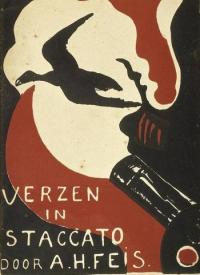
De slag.
De zon.
Een woud.
Een veld.
Een vliet:
‘t Is geel,
groen, blauw,
maar rood
is ‘t niet.
Gerij.
Gedraaf.
Geschut.
Gedreun:
Gegil!
Gekerm!
Gezucht!
Gekreun!
Geen zon.
Geen woud.
Geen mensch!
Geen hart!
‘t Is bloed!
‘t Is rood!
‘t Is grijs!
‘t Is zwart!
Agnita Feis
(1881 – 1944)
Uit: Oorlog. Verzen in Staccato (1916).
De Slag
• fleursdumal.nl magazine
More in: - Book Stories, Agnita Feis, Archive E-F, Archive E-F, De Stijl, Feis, Agnita, Theo van Doesburg
In Punk Rock Is Cool for the End of the World, David Trinidad brings together a comprehensive selection of Ed Smith’s work: his published books; unpublished poems; excerpts from his extensive notebooks; photos and ephemera; and his timely “cry for civilization,” “Return to Lesbos”: put down that gun / stop electing Presidents.
 Ed Smith blazed onto the Los Angeles poetry scene in the early 1980s from out of the hardcore punk scene. The charismatic, nerdy young man hit home with his funny/scary off-the-cuff-sounding poems, like “Fishing”: This is a good line. / This is a bad line. This is a fishing line.
Ed Smith blazed onto the Los Angeles poetry scene in the early 1980s from out of the hardcore punk scene. The charismatic, nerdy young man hit home with his funny/scary off-the-cuff-sounding poems, like “Fishing”: This is a good line. / This is a bad line. This is a fishing line.
Ed’s vibrant “gang” of writer and artist friends―among them Amy Gerstler, Dennis Cooper, Bob Flanagan, Mike Kelley, and David Trinidad―congregated at Beyond Baroque in Venice, on LA’s west side. They read and partied and performed together, and shared and published each others’ work.
Ed was more than bright and versatile: he worked as a math tutor, an animator, and a typesetter. In the mid-1990s, he fell in love with Japanese artist Mio Shirai; they married and moved to New York City. Despite productive years and joyful times, Ed was plagued by mood disorders and drug problems, and at the age of forty-eight, he took his own life.
Ed Smith’s poems speak to living in an increasingly dehumanizing consumer society and corrupt political system. This “punk Dorothy Parker” is more relevant than ever for our ADD, technology-distracted times.
Ed Smith (1957–2005) was a poet involved in the punk and alternative arts scenes in Los Angeles in the early 1980s. His books were Fantasyworld (1983) and Tim’s Bunnies (1988). His poems appeared in Rolling Stone, St. Mark’s Poetry Project Newsletter, and other publications. Smith also worked as an animator on Nickelodeon’s Blue’s Clues.
David Trinidad is the author of more than twenty books of poetry, collabora-tions, and edited volumes. These include Swinging on a Star (2017), Notes on a Past Life (2016), Dear Prudence: New and Selected Poems (2011), and Plasticville (2000), finalist for the Lenore Marshall Poetry Prize. Trinidad is editor of A Fast Life: The Collected Poems of Tim Dlugos (2011), which won a Lambda Literary Award. He is a professor of poetry in the English and Creative Writing Department at Columbia College, Chicago.
Punk Rock Is Cool for the End of the World:
Poems and Notebooks of Ed Smith
by Ed Smith (Author), David Trinidad (Editor)
June 11, 2019
Publisher: Turtle Point Press
Language: English
ISBN-10: 1885983670
ISBN-13: 978-1885983671
Paperback
400 pages
$15.78
# new books
Poems and Notebooks
Ed Smith
• fleursdumal.nl magazine
More in: # Music Archive, # Punk poetry, - Book News, - Book Stories, Archive S-T, Archive S-T
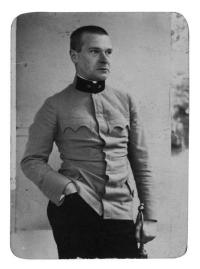
Untergang
(an Karl Borromäus Heinrich)
Über den weißen Weiher
Sind die wilden Vögel fortgezogen.
Am Abend weht von unseren Sternen ein eisiger Wind.
Über unsere Gräber
Beugt sich die zerbrochene Stirne der Nacht.
Unter Palmen schaukeln wir auf einem silbernen Kahn.
Immer klingen die weißen Mauern der Stadt.
Unter Dornenbogen
O mein Bruder klimmen wir blinde Zeiger gen Mitternacht.
Georg Trakl
(1887 – 1914)
Untergang, 1913
• fleursdumal.nl magazine
More in: Archive S-T, Trakl, Georg, Trakl, Georg

Spiel
Deine Finger perlen
Und
Kollern Stoßen Necken Schmeicheln
Quälen Sinnen Schläfern Beben
Wogen um mich.
Die Kette reißt!
Dein Körper wächst empor!
Durch Lampenschimmer sinken deine Augen
Und schlurfen mich
Und
Schlürfen schlürfen
Dämmern
Brausen!
Die Wände tauchen!
Raum!
Nur
Du!
August Stramm
(1874-1915)
Spiel, 1914
• fleursdumal.nl magazine
More in: *War Poetry Archive, Archive S-T, Expressionism, Stramm, August

Les Fenêtres
Du rouge au vert tout le jaune se meurt
Quand chantent les aras dans les forêts natales
Abatis de pihis
Il y a un poème à faire sur l’oiseau qui n’a qu’une aile
Nous l’enverron en message téléphonique
Truamatisme géant
Il fait couler les yeux
Voilà une jolie jeune fille parmi les jeunes Turinaises
Le pauvre jeune homme se mouchait dans sa cravate blanche
Tu soulèveras le rideau
Et maintenant voilà que s’ouvre la fenêtre
Araignées quand les mains tissaient la lumière
Beauté pâleur insondables violets
Nous tenterons en vain de prendre du repos
On commencera à minuit
Quand on a le temps on a la liberté
Bignorneaux Lotte multiples Soleils et l’Oursin du couchant
Une vielle paire de chaussures jaunes devant la fenêtre
Tours
Les Tours ce sont les rues
Puits
Puits ce sont les places
Puits
Arbres creux qui abritent les Câpresses vagabondes
Les Chabins chantent des airs à mourir
Aux Chabines marrones
Et l’oie oua-oua trompette au nord
Où le train blanc de neige et de feux nocturnes fuit l’hiver
O Paris
Du rouge au vert tout le jaune se meurt
Paris Vancouver Hyères Maintenon New-York et les Antilles
Le fenêtre s’ouvre comme une orange
Le beau fruit de la lumière
Guillaume Apollinaire
(1880 – 1918)
Les Fenêtres
• fleursdumal.nl magazine
More in: Apollinaire, Guillaume, Archive A-B, Guillaume Apollinaire
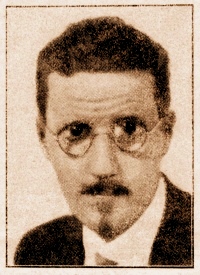
Bahnhofstrasse
The eyes that mock me sign the way
Whereto I pass at eve of day.
Grey way whose violet signals are
The trysting and the twining star.
Ah star of evil! star of pain!
Highhearted youth comes not again
Nor old heart’s wisdom yet to know
The signs that mock me as I go.
James Joyce
(1882-1941)
Bahnhofstrasse
fleursdumal.nl magazine
More in: Archive I-J, Archive I-J, Joyce, James, Joyce, James
A Portrait of One: Harry Phelan Gibb
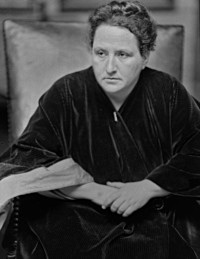 Some one in knowing everything is knowing that some one is something.
Some one in knowing everything is knowing that some one is something.
Some one is something and is succeeding is succeeding in hoping that thing.
He is suffering.
He is succeeding in hoping and he is succeeding in saying that that is something.
He is suffering, he is suffering and succeeding in hoping that in succeeding in saying that he is succeeding in hoping is something.
He is suffering, he is hoping, he is succeeding in saying that anything is something.
He is suffering, he is hoping, he is succeeding in saying that something is something.
He is hoping that he is succeeding in hoping that something is something.
He is hoping that he is succeeding in saying that he is succeeding in hoping that something is something.
He is hoping that he is succeeding in saying that something is something.
Gertrude Stein
(1874-1946)
A Portrait of One
Harry Phelan Gibb
fleursdumal.nl magazine
More in: Archive S-T, Archive S-T, Gertrude Stein, Stein, Gertrude
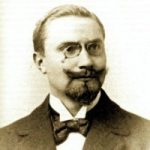
Fluch
Du sträubst und wehrst!
Die Brände heulen
Flammen
Sengen!
Nicht Ich
Nicht Du
Nicht Dich!
Mich!
Mich!
August Stramm
(1874-1915)
Fluch, 1914
• fleursdumal.nl magazine
More in: *War Poetry Archive, Archive S-T, Expressionism, Stramm, August
Het Russische absurdisme laat zich gemakkelijk terugbrengen tot één man: Daniil Charms. “Charms is kunst,’ schreef een vriend over hem.
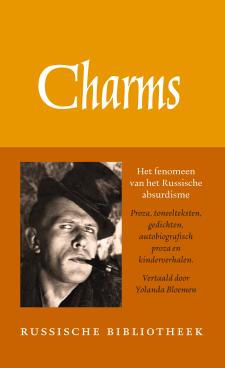 Met zijn opvallende verschijning, zijn excentriciteit, zijn creatieve tegendraadsheid was hij een fenomeen en groeide hij na zijn dood uit tot een wereldwijd bekende cultschrijver. “Mij interesseert alleen “onzin”,’ schreef hij ooit, “alleen dat wat geen enkele praktische zin heeft.’
Met zijn opvallende verschijning, zijn excentriciteit, zijn creatieve tegendraadsheid was hij een fenomeen en groeide hij na zijn dood uit tot een wereldwijd bekende cultschrijver. “Mij interesseert alleen “onzin”,’ schreef hij ooit, “alleen dat wat geen enkele praktische zin heeft.’
Charms blinkt uit in het tonen van de onsamenhangendheid van het bestaan en de onvoorspelbaarheid van het lot. Hij zoekt naar een ongefilterde verbeelding van de chaos die wij voortbrengen, los van zingeving en in de hoop op nieuwe ervaringen en aha-erlebnissen. In zijn werk laat hij willekeur vergezeld gaan van een stevige dosis, vaak zwartgallige, humor.
Voor het eerst verschijnt een grote uitgave van Charms’ werk in de Russische Bibliotheek, samengesteld uit proza, toneelteksten, gedichten, autobiografisch proza en kinderverhalen, en rijkelijk aangevuld met avantgardistische illustraties.
Auteur: Daniil Charms
Verzameld werk
Vertaald door Yolanda Bloemen
Russische Bibliotheek (RB)
Uitgeverij van Oorschot
Verschijningsdatum januari 2018
Taal Nederlands
1e druk
Bindwijze: Hardcover
Afmetingen 20,3 x 12,8 x 3,4 cm
736 pagina’s
ISBN 9789028282353
€ 44,99
• fleursdumal.nl magazine
More in: *Concrete + Visual Poetry A-E, - Book News, - Bookstores, Archive C-D, Archive C-D, Art & Literature News, Expressionism, Kharms (Charms), Daniil, Psychiatric hospitals
Thank you for reading Fleurs du Mal - magazine for art & literature